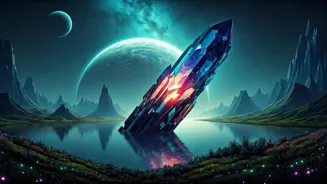Water, the Key?
The search often centers on water. Planets like K2-18 b, a super-Earth, are being analyzed to see if they have oceans, increasing their chances for habitability.
However, this is not the only way for life to survive as some aliens may not need water like us. Moreover, Saturn's moon Enceladus' ocean pH might support life, which is another major discovery in this field.
Beyond Carbon's Realm
While carbon-based life is what we know, research suggests life might exist based on other elements. Some theories propose that aliens could survive on cosmic rays. The discovery that precursors of life could form in lakes on Saturn's moon Titan shows the diversity of possibilities. These advancements are quite similar to our Indian mythological stories.
Habitable Zones Explored
Scientists are exploring exoplanets in habitable zones. A fifth planet orbiting a nearby star in the habitable zone has been found. Also, steam-engulfed exoplanets are under intense investigation. A new model helps to determine which distant planets may host life. These discoveries give us an idea of what is possible beyond our solar system.
Where to Seek?
If aliens explore space as humans do, the NASA scientists know where to look. The 'Wow! signal' is being analyzed to find its source, and it's still likely not aliens. These efforts are similar to the space program in India, such as the Chandrayaan missions. Space exploration is a collective human endeavor.
The Future Awaits
The search for life continues, with scientists pushing boundaries. From studying Mars' clay layers for signs of life to figuring out which distant planets can host life, the quest is ongoing. This work builds on milestones, like SpaceX’s progress, to explore and better understand our universe. The future of space exploration holds immense potential.














